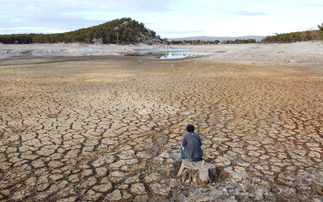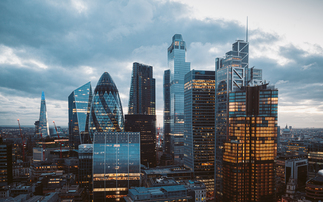Jeff Seabright, Chief Sustainability Officer at Unilever, explains how the company has integrated the SDGs into its strategy and why the global financial system need urgent reform
BusinessGreen: What was Unilever's initial response to the SDGs?
The purpose of business is first and foremost to serve society and Unilever has always embraced this responsibility. For over a hundred years, our goal has been to improve the lives of the world's citizens one day and one person at a time. Our mission has not changed much since our founder William Lever focused on what he called 'shared prosperity' during the 1880s. Today we are living out this commitment through the Unilever Sustainable Living Plan (USLP), which aims to grow our business whilst halving our environmental footprint and increasing our social impact.
This vision is closely aligned with the Sustainable Development Goals (SDGs), which provide us all with a roadmap on how to achieve long-term growth and development, in sustainable way, by 2030. So, whilst our unique heritage still shapes the way we do business today, our scale and reach mean we're well placed to both contribute to and benefit from the SDGs, which we're addressing in a number of ways through the USLP. However, to drive this forward with greater speed, we are consistently setting ourselves new and ambitious targets: for example, to become carbon positive by 2030, and ensure all our plastic packaging is fully recyclable, reusable or compostable by 2025.
How does a company go about addressing such a large number of goals and targets? Do you have to prioritise or should you engage with all of them?
The SDGs are a scorecard on how well the world is doing, but also as an enormous opportunity to address some of the world's biggest challenges. We are getting to the point where in each of the opportunities identified (be it food security, education, climate change, sanitation, gender equality etc.), the cost of not acting is becoming higher than the cost of action. At a time that we need jobs and growth, we have the plan already given to us. So, it's in the best interest of businesses to act.
For us, implementing the Goals means applying an SDG lens to every aspect of strategy: appointing the right leaders, innovating sustainable solutions that improve people's lives, inspiring more sustainable choices, and working in partnerships with others to drive systemic, lasting change around the world.
No single Goal is more important than another and they are all interconnected; that's the beauty of the Goals. Every business can make a difference, irrespective of its size. It's up to each company to identify in which areas they can have the greatest impact and work with others - through SDG 17 on Partnerships - to create a shift across the industry.
Do you agree with some of the criticism that they can be difficult for businesses to navigate and translate?
Companies have a once-in-a-lifetime opportunity to embrace the SDGs as a driver of business growth. There are still many challenges to overcome, including the short-term focus of financial markets, the difficulty in giving social or environmental capital a true value and political systems too focused on the next election cycle instead of on the next generation. If they fail to get behind systems change and the kind of inclusive capitalism laid out by the SDGs, the costs and uncertainty of doing business will swell. On the other hand, if a critical mass of companies joins the movement for system change, it will create an unstoppable force.
How has Unilever taken practical steps in support of the SDGs?
We are working across many of the SDGs through the USLP, which sets out three big goals: to help more than a billion people to improve their health and well-being; halve our environmental footprint; and enhance the livelihoods of millions across our supply chain.
The plan takes responsibility across the total value chain - from farm to fork and addresses external issues such as climate change, food security, deforestation, and sanitation. It puts sustainability at the heart of our operations, supply chain, innovation and brands. It's a moral and business imperative. Through the USLP we are cutting costs, reducing risk, driving growth and engraining a sense of purpose throughout the organisation, which attracts talent.
Transparency is also key to reestablish trust and our plan calls out 50 targets to be achieved and relies heavily on working in partnership with others. Increasingly driving more transformational changes especially around livelihoods, women, social compliance in the value chain, climate change, food security and sanitation, health and hygiene. In doing so, we are unlocking new markets and investing in brands with purpose and innovation. The interdependence and mutuality of the goals ensures that progress against one leads to progress against others.
How has the company built a business case for working on the SDGs? What are the benefits of having an SDG-informed sustainability strategy?
The moral obligations of aligning to the SDGs is clear, but so too is the business case for the SDGs. No longer must moral and business square off, now business will do well by doing good. It is truly one of the most exciting business opportunities of our time.
The Business & Sustainable Development Commission, co-founded by Unilever, concluded that successful delivery of the SDGs will create market opportunities of at least $12tr a year and create 380 million jobs by 2030 in just four economic areas - food and agriculture, cities, energy, and health and wellbeing. Companies that align themselves with the SDG framework have the potential to grow two or three times faster than average GDP in the next 10 to 15 years.
But, to realise these economic benefits, business needs to truly embed sustainability into business and right across the value chain, rather than existing alongside. And that requires a real shift in the way we do business.
Do you find any of the SDGs particularly exciting for the business?
As a consumer goods company, the best way in which we can bring our purpose to life is through our brands and by leveraging our operating model. As a company of over 160,000 employees, with 2.5 billion consumers who use our products on any given day, we have an enormous opportunity and responsibility to help address the world's burning issues, as called out in the SDGs.
Brands that help solve problems are relevant and accepted. Not surprisingly, the stronger this purpose the better the brands do. Our sustainable living brands are delivering more than 60 percent of Unilever's growth, and growing over 50 percent faster than the rest of the business. We are orienting our brands to serve the underserved, and when we do it well, we are rewarded with stronger business results. It requires a ruthless external focus and caring enormously about the consumers we serve. But, above all, it requires us to simply put the interest of others ahead of our own.
And do you recognise any of the SDGs as particularly problematic?
I would say that the challenge we face is more about the system in which we operate. Like all businesses, we are impacted by the increasingly short-term focus of financial markets and political systems. We need a reform of the financial system, with greater focus on serving long-term needs of society. Equally challenging is the need to change consumer habits at scale. Whilst people are increasingly asking for more responsible businesses, we still have a way to go to drive more sustainable behaviour en masse. And finally, we need bolder, braver action and stronger willpower from leaders in a position to really make a difference.
Do you think the government and the business community are doing enough in support of the SDGs?
We are going in right direction but of course not going faster or further enough. If we harness willpower and creativity in the right way, and in partnership with others, there are unlimited opportunities. After all, no one organisation working in isolation can hope to do move the needle to build a better world. That's why working in collaboration with others is so crucial - between businesses, customers, suppliers, governments, academia and NGOs - all key to driving the more sustainable form of capitalism that the SDGs demand. It requires true leaders who put the interest of others ahead of their own. Who know it's not about themselves. We have to find, invest in and empower those leaders, especially millennials and women, making them an integral part of this change agenda.
Do you think they can be met?
Yes, I'm confident that they can be met. Consumers are demanding change around the world and we see an increasing number of businesses and governments stepping up to the plate with bold actions. Of course, as I've said, there are still challenges, for example we need to overcome the common misconception that somehow action on climate and poverty are at odds with economic growth. As a major report released by the Global Commission on the Economy and Climate this month indicated, bold climate action could deliver at least $26tr in economic benefits through to 2030, compared with business-as-usual. As businesses, we will need to give confidence to governments that economies can grow inclusively and sustainably and that policies which reward sustainable behaviour are better for the bottom line.









